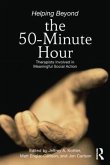In a society in which psychological knowledge is shaped as much, if not more, by supermarket tabloids, talk shows, and self-proclaimed "self-help gurus" as it is by the latest scientific advances, there is a pressing need for a book that helps students and the public distinguish fact from fiction in the world of psychology. 50 Great Myths of Popular Psychology answers this need by using popular myths as a vehicle for distinguishing science from pseudoscience. Organized around key topic areas of modern psychology such as brain functioning, perception, development, memory, emotion, intelligence, learning, personality, mental illness, and psychotherapy, this book will help students and laypersons to critically evaluate the information and misinformation that is generated by popular psychology.
Hinweis: Dieser Artikel kann nur an eine deutsche Lieferadresse ausgeliefert werden.
Hinweis: Dieser Artikel kann nur an eine deutsche Lieferadresse ausgeliefert werden.
"Popular psychology is a prolific source of myths. A new book does an excellent job of mythbusting: 50 Great Myths of Popular Psychology. Some myths I had swallowed whole and the book's carefully presented evidence made me change my mind. They cover 50 myths in depth, explaining their origins, why people believe them, and what the published research has to say about the claims. Everything is meticulously documented with sources listed. The authors have done us a great service by compiling all this information in a handy, accessible form, by showing how science trumps common knowledge and common sense, and by teaching us how to question and think about what we hear. I highly recommend it." (Dr. Harriet Hall for Skeptic Magazine, February 2010, and ScienceBasedMedicine.org, November 2009)
"50 Great Myths of Popular Psychology is written in an engaging style and is valuable for both professionals and the general public. I highly recommend it." (Skeptical Inquirer, February 2010)
"Delightful and important book ... .This is a fine tool for teaching critical thinking. 50 Great Myths of Popular Psychology is much more than an entertaining put-down of popular misconceptions. Any psychologist can put [this book] to good use. Certainly teachers can use it as a supplement to aid in teaching critical thinking and to suggest ideas for research on other myths.We can give it to family members and friends who are curious about what psychology has to contribute and might themselves engage in some myth busting." (PsycCritiques, January 2010)
"If you are familiar with other books by the same authors, you know that the writing style is incredibly engaging and easy-to-read, making the book accessible to those with little knowledge of psychology and well as those with considerable education in the field. While we certainly won't stop combating clinical psychology myths here at PBB, it's always exciting to come across like-minded folks also providing valuable material!" (Psychotherapy Brown Bag, October 2009)
"50 Great Myths of Popular Psychology is a fascinating book, and while reading, I cheered the authors on. If you have questioned science as some of us have, this book will reassure you that your thinking was perfectly logical and correct. 50 Great Myths of Popular Psychology clarifies things about which I have always wondered, but never challenged. Myths about aging, memory, learning, emotions and motivation, and mental illness are among the subjects covered. The reading is enlightening, refreshing and interesting.You don't have to be a Ph.D, or even a student of psychology to enjoy this book. It's is written in language all can understand and the information is easily digested." (Basil & Spice, October 2009)
"Scott Lilienfeld and his coauthors explore the gulf between what millions of people say is so and the truth. Some of these myths are just plain fascinating." (US News and World Report, October 2009)
"50 Great Myths of Popular Psychology is written in an engaging style and is valuable for both professionals and the general public. I highly recommend it." (Skeptical Inquirer, February 2010)
"Delightful and important book ... .This is a fine tool for teaching critical thinking. 50 Great Myths of Popular Psychology is much more than an entertaining put-down of popular misconceptions. Any psychologist can put [this book] to good use. Certainly teachers can use it as a supplement to aid in teaching critical thinking and to suggest ideas for research on other myths.We can give it to family members and friends who are curious about what psychology has to contribute and might themselves engage in some myth busting." (PsycCritiques, January 2010)
"If you are familiar with other books by the same authors, you know that the writing style is incredibly engaging and easy-to-read, making the book accessible to those with little knowledge of psychology and well as those with considerable education in the field. While we certainly won't stop combating clinical psychology myths here at PBB, it's always exciting to come across like-minded folks also providing valuable material!" (Psychotherapy Brown Bag, October 2009)
"50 Great Myths of Popular Psychology is a fascinating book, and while reading, I cheered the authors on. If you have questioned science as some of us have, this book will reassure you that your thinking was perfectly logical and correct. 50 Great Myths of Popular Psychology clarifies things about which I have always wondered, but never challenged. Myths about aging, memory, learning, emotions and motivation, and mental illness are among the subjects covered. The reading is enlightening, refreshing and interesting.You don't have to be a Ph.D, or even a student of psychology to enjoy this book. It's is written in language all can understand and the information is easily digested." (Basil & Spice, October 2009)
"Scott Lilienfeld and his coauthors explore the gulf between what millions of people say is so and the truth. Some of these myths are just plain fascinating." (US News and World Report, October 2009)

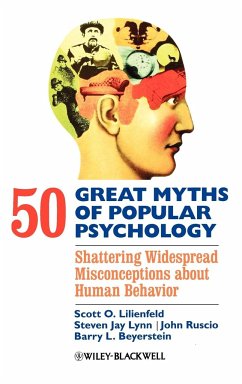
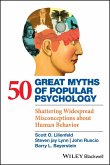
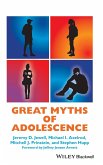
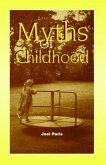

![Nebraska Symposium on Motivation [Papers]; 50 Nebraska Symposium on Motivation [Papers]; 50](https://bilder.buecher.de/produkte/65/65542/65542834m.jpg)
